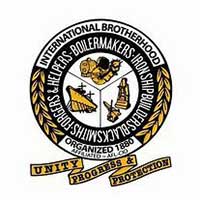Boilermakers Local 60
Job Information

Learn about the Boilermakers building trade, job information, and how to start your new career.
Boilermakers Local 60 Job Overview
Boilermakers and boilermaker mechanics make, install, and repair boilers, vats and other large vessels that hold liquid or gases. Boilers supply steam to drive huge turbines in electric power plants and to provide heat and power in buildings, factories, and ships. Tanks and vats are used to process and store chemicals, oil, beer and hundreds of other products.
Following blueprints, boilermakers locate and mark reference points on the boiler foundation for installing boilers and other vessels, using straightedges, squares, transits and tape measures. They attach rigging and signal crane operators to lift heavy frame and plate sections and other parts into place. They align sections, using plumb bobs, levels, wedges and turnbuckles. Boilermakers use hammers, files, grinders and cutting torches to remove irregular edges so the edges fit properly.
Because boilers last a long time, boilermakers regularly maintain them and update components such as burners and boiler tubes to increase efficiency. Boilermaker mechanics maintain and repair boilers and similar vessels. They inspect tubes, fittings, valves, controls, and auxiliary machinery and clean or supervise the cleaning of boilers. They repair or replace defective parts, using hand and power tools, gas torches and welding equipment, and may operate metalworking machinery to repair or make parts. They also dismantle leaky boilers, patch weak spots with metal stock, replace defective sections, or strengthen joints.
Must be at least 18 years old; must present birth certificate; must have original Social Security card; must have a high school diploma or G.E.D. certificate; must have reliable transportation; must be able to speak, write and read the English language; must pass drug screening; must pass a physical exam; must be a legal resident of the United States; and must reside in the local union jurisdiction.
Apprentices start out at 70 percent. Apprenticeship program usually consists of four years of on-the-job training, supplemented by about 144 hours of classroom instruction each year in subjects such as set-up and assembly rigging, welding of all types, blueprint reading and layout.
Drafting, industrial technology and any classes related to construction or engineering technology.
Boilermakers work in all types of weather conditions and at various heights. Sometimes working space is confined.
Must be able to understand how things should fit together; must be able to see details in objects; and must be able to make decisions.
Apprentices start at 70 percent of scale. Current wage rates are:
- $41.00/hr Base Wage, plus
- $7.07/hr Health and Welfare, Plus
- $20.07/hr Annuity and Pension.
(rates subject to change)
3 STEPS TO START YOUR NEXT CAREER
Apprentice Application
- Applications are accepted on the last Thursday of every month between 8:00am - 9:00am
Information to Bring
- Birth Certificate
- High School Diploma
- Welding Experience Document
Contact Name
Jason Lancaster

Construction Jobs
Helping Illinois construction workers
train, grow, & find top paying jobs
